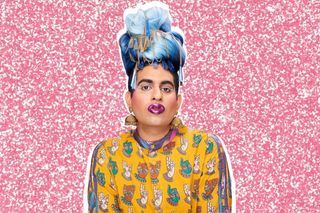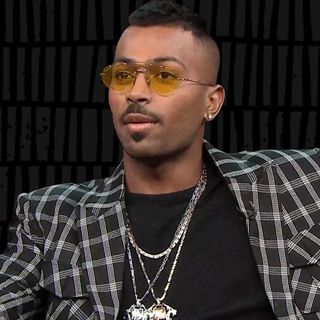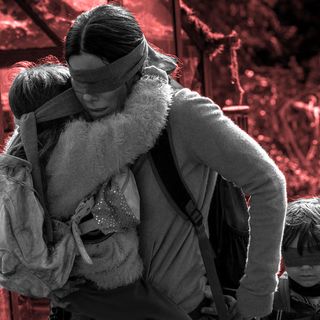
Talking With Alok Vaid‑Menon About Art, Activism, and the Transfeminine Movement
“We have been taught to fear the very things that have the potential to set us free.”

Alok Vaid Menon is a gender non-conforming performance artist, writer, and educator. Their eclectic style and poetic challenge to the gender binary have been internationally renowned. Alok was recently the youngest recipient of the prestigious Live Works Performance Act Award. They have presented their work at 350 venues in more than 40 countries, and most recently performed at the Mumbai arts festival, Spoken 2019. We spoke with them about their creative process, what it’s like to perform for Indian audiences, and their resolutions for the new year.
The interview has been edited for clarity and length.
The Swaddle: Tell us about what got you started as an artist? What got you to where you are now?
Alok Vaid-Menon: I started writing poetry when I was 12 years old because I needed somewhere to put the pain of being harassed, growing up. Art-making has always been inextricably linked to healing for me. There have been so many times that I was pressured to do something else with my art but I always return to asking myself: “How is this healing me?” And that question has carried me to where I am today. I return to my pain and try to make something beautiful from it.
The Swaddle: What’s your creative process like? Where do you go, or whom do you go to, to draw inspiration?
AVM: I protect my feelings, especially the ones we are taught to dismiss. They are my guides to the memories, aesthetics, and encounters I need [in order] to create. I embrace constant motion. Art is the product that is more than the sum of its parts: I need to find the right parts to make the art. I surround myself with other artists who are trying to imagine something else. I run away to run toward. I embrace chaos and contradiction.
The Swaddle: How do your style and social media presence function in relation to your politics? How do you navigate the importance of representation — especially of trans and gender non-conforming folks — while knowing that visibility doesn’t necessarily equal safety?
AVM: At every level this world is trying to disappear gender non-conformity and create the mirage that there are just two ways to be: man OR woman. Social media allows me to visualize gender non-conformity for many people and places where people would never see anyone like me in person. There are so many (wrong) stories told about us such that people think that they know us before they have even gotten a chance to experience us. I use social media not necessarily to be understood, but to be experienced.
That being said: it comes at a great cost to me. I am constantly and ruthlessly harassed online and offline. Visibility actually means violence. But I keep going because of the support of my followers and friends who believe in me. You create art that functions as activism as well.
The Swaddle: Do you think there is a political, revolutionary value to art? Or are we placing too much trust and too much pressure on it to solve larger, systemic problems?
AVM: I think we are constantly trying to call things radical to make them redeemable. I believe that art is … that’s it. It can be many things and mostly, it depends on how it’s being used. I used to have more grandiose notions of what my art could do, but now I’ve come to accept that it’s a space for me to be honest and encourage vulnerability with other people, thereby templating another way to relate to one another. That feels like enough for me right now.
The Swaddle: Do you find a difference in how people understand their gender in India, versus in other places you’ve lived? Is there a way to occupy multiplicity without creating any kind of binary or opposition? How do we begin the work of imagining that?
AVM: Gender is relational, meaning it’s produced through a series of encounters, meaning of course, in India, there are so many different understandings of gender that have everything to do with class, caste, religion, and geography. I would say gender non-conforming people, of various identifications, are and have been for hundreds of years templating multiplicity beyond binaries. So often people frame this work as impossible, but it’s there around us. We just have to shift our focus. This requires heeding the guidance of the very people we have been taught to dismiss.
The Swaddle: How would you explain a transfeminist movement to people? What are the things cisfeminism might get wrong about gender?
AVM: Once again, a re-occurring theme here is that I am largely ambivalent toward categories, definitions, and cohesive norms. I don’t think there is a unified “transfeminist movement” and I’m not sure that’s even the goal. From my vantage point I believe that patriarchy produces and polices binary genders and sexes of man/woman and male/female. Intersex and gender non-conforming people who transgress these binaries experience extreme persecution. In order to combat this violence we must end gender and sex binaries.
Feminist politics which rely and reproduce gender/sex binaries are insufficient and can be actively harmful. A lot of discussion is taking place on the level of policy changes for trans people in India, whether it’s within corporate India or whether its really a thinly veiled form of institutional violence (i.e. the Transgender Persons Bill).
The Swaddle: Do you believe in the power of legislature to change realities for trans and gender non-conforming people? Or are there other avenues we must be looking towards to support these communities?
AVM: I believe that we have to struggle at all levels: the legislative, the cultural, the social, the aesthetic, etc. What strikes me, however, is that the law is often over-determined as the only location of ‘politics.’ But politics is far more expansive than that: it’s how we treat each other, how we distribute our time, the images we produce and consume. What is the use in shifting laws when hearts and minds remain unchanged?
What often gets lost in our support of marginalized people is their/our artistry and creative imagination. I would love to see more resources specifically allocated for trans and gender non-conforming artists, especially those from oppressed castes and classes.
The Swaddle: How do festivals and events like Spoken help increase visibility for trans and gender non-conforming artists and what are the ways communities can come together and support them?
AVM: As a trans artist it is rare for me to not be curated for specifically Pride-oriented programming. Despite speaking to a wide range of themes, we are constantly reduced to our gender. I commend Spoken for doing something different. It’s important to curate and recognize trans talent as universal, and we need everyone to apply pressure to arts institutions to ensure that trans people are represented consistently. It’s also about taking responsibility and protecting trans artists when we are there: not tolerating transphobia and ensuring that audiences know how to respectfully engage with us.
The Swaddle: What have your experiences been like performing for Indian audiences at events like Spoken Fest 2019?
AVM: Lovely, enriching, tremendous. In my life, I’ve experienced the most persecution from other Indian people, so receiving the validation of Indian audiences feels so vital and precious.
The Swaddle: What are your New Year’s resolutions?
AVM:
- Ambition beyond recognition. Defy easily consumable narratives, be gnarly and ruthlessly indigestible.
- Boundaries are not borders. Protect your energy from those who live for you but would never die for you.
- Perfection is loneliness. Purity is not the goal; it never was.
- Conformity is not community: be yourself even when it hurts. Especially when it hurts.
- Your greatest gifts are your biggest flaws and your biggest flaws are your greatest gifts. This is a contradiction: so are you.
- Be as fluent in the language of injury as complicity: embrace simultaneity in everyone and everything.
- There are as many ways to be as there are people in this world. Infinity is not chaos, it just is.
- Remove everything in your path that keeps you from making art.
- Forgive, but do not forget. empathize but do not enable. Care, but do not mistake fixing other people as fixing yourself.
- Don’t confuse the way you have come to live with the only way to live. Remain open to the universe inviting you to shift.
- Run into the flames. Never forget: we have been taught to fear the very things that have the potential to set us free.
Nadia Nooreyezdan is The Swaddle's culture editor. Since graduating from Columbia Journalism School, she spends her time thinking about aliens, cyborgs, and social justice sci-fi. She's also working on a memoir about her family's journey from Iran to India.
Related


BCCI’s Response to Hardik Pandya’s Sexist Remarks Doesn’t Solve the Real Problem
